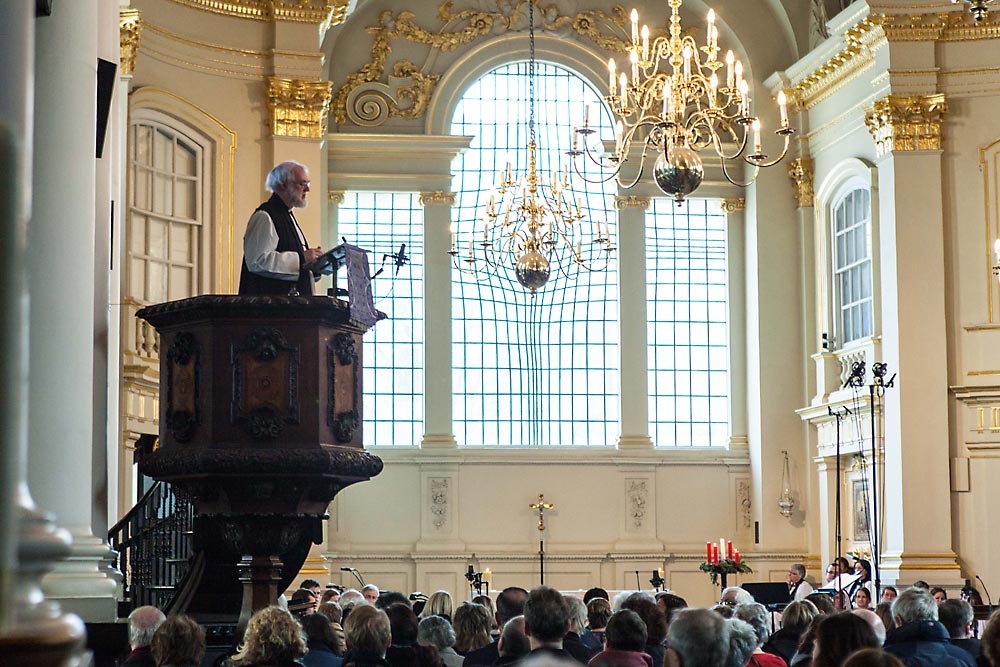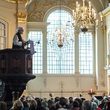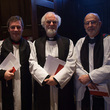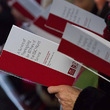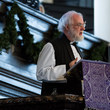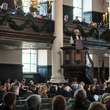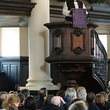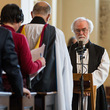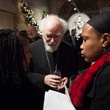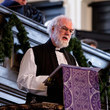Archbishop’s sermon at a Service of Thanksgiving to celebrate 80 Years of the BBC World Service
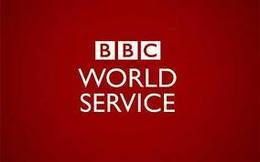
Wednesday 12th December 2012
The Archbishop of Canterbury, Dr Rowan Williams, today spoke about the importance of free speech at a Service of Thanksgiving to celebrate 80 Years of the BBC World Service.“We in the UK are in the middle of a lively argument about free speech and the regulation of the media. It’s easy to get bogged down in the pros and cons of press regulation and the exact degree of legal backing it needs. But we risk forgetting the all-important issue of why free speech really matters. Which is why this particular celebration today is so timely and so significant.”
During his sermon at the service at St Martin-in-the-Fields church in Trafalgar Square, London, he described the BBC World Service as ‘one of the modern age’s great symbols of freedom of speech in the sense that it has fought back, quietly and persistently, against so many attempts to silence unwelcome truths’, before going on to describe the components of ‘morally important and politically essential’ freedom of speech as the ‘freedom to stand back from any particular loyalty in the name of loyalty to the truth, and freedom to speak truths that the powerful want hidden or ignored’.
“It is about sharing the reality of painful and difficult human experience so that others may know it for what it is and so that they may have no excuse for ignoring it.”
However, the Archbishop warned that freedom of speech “ is not simply a matter of the liberty to spread random or trivial information, certainly not the liberty of expressing abusive or demeaning opinions. And no-one can be complacent about the levels of hurt and distress experienced by those who have been at the receiving end of intrusive and insensitive investigation in the name of this debased version of liberty.”
Illustrating its record of broadcasting ‘voices that are being silenced by violence or injustice’, the Archbishop highlighted one of the BBC World service’s greatest achievements as its ‘commitment to searching out the voices that would otherwise not be heard. There could be no better way of asserting the dignity that belongs to every citizen, every human being.’
In concluding his sermon, Dr Rowan Williams urged the congregation to continue in the commitment to ‘the freedom of speech that matters’:
“As we celebrate the World Service’s witness to liberating truthfulness and independent vision – and so to honour and justice – we are invited to renew our own commitment, here in this congregation but also for the whole of our society. May God help us to honour and preserve the freedom of speech that matters – the freedom to step aside from tribal and local partisanship for the sake of a wider human sympathy, the freedom to listen patiently and passionately for the voices that are being silenced by violence or injustice, the freedom to speak to and for the dignity of all.”
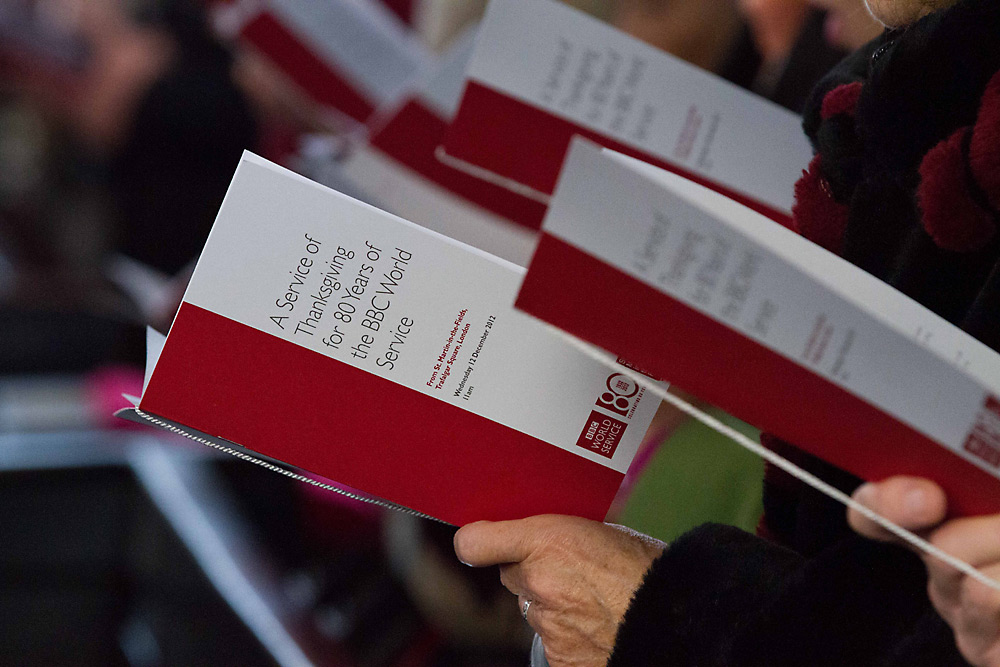
Listen to an audio recording of the sermon, or read a transcript below.
Just at the moment, we in the UK are in the middle of a lively argument about free speech and the regulation of the media. It’s easy to get bogged down in the pros and cons of press regulation and the exact degree of legal backing it needs. But we risk forgetting the all-important issue of why free speech really matters. Which is why this particular celebration today is so timely and so significant.
The BBC World Service has been one of the modern age’s great symbols of freedom of speech in the sense that it has fought back, quietly and persistently, against so many attempts to silence unwelcome truths. In dealing with the old Soviet bloc or with China in the nineties, it had to contend with systematic efforts to jam its communications and discredit its reporting; those both directly and indirectly involved with news gathering and comment have constantly put their safety at risk – and sometimes lost their lives as a result. We’ve already been reminded by Lord Patten that these dangers are as vivid today as they have ever been. So this event has something of the character of a remembrance not only of triumphs but also of martyrdoms for free communication. And the wonderful paradox is that the more efforts have been made to frustrate or sideline what the Service has done, the more its reputation has grown and the more risks people have taken to use it and support it.
Throughout all this extraordinary history, two elements of freedom have been in the forefront of concern. The first is the freedom to ask questions of everyone – not just of foreign states and rulers but of our own policies too – and to acknowledge criticisms and attacks on Britain fairly and carefully. People will only trust a broadcaster if they know that he or she is not simply reading a script written by government, but is paying people the ultimate compliment of letting them make their own minds up. And the second main thing is the affirmation of everyone’s freedom to have a voice in discussing their situation. Perhaps the most impressive single thing in the World Service’s record is this commitment to searching out the voices that would otherwise not be heard. There could be no better way of asserting the dignity that belongs to every citizen, every human being.
In other words, real freedom of speech, the kind that is morally important and politically essential, involves two things – freedom to stand back from any particular loyalty in the name of loyalty to the truth, and freedom to speak truths that the powerful want hidden or ignored. It is not simply a matter of the liberty to spread random or trivial information, certainly not the liberty of expressing abusive or demeaning opinions. And no-one can be complacent about the levels of hurt and distress experienced by those who have been at the receiving end of intrusive and insensitive investigation in the name of this debased version of liberty. It is about sharing the reality of painful and difficult human experience so that others may know it for what it is and so that they may have no excuse for ignoring it. This kind of truthtelling is always radical because it demands that we identify with the situations of those very unlike us and recognise that they share the same world and the same human challenges. Truth is not likely to be found where people are told never to ask questions or where those who are backed by force have the right to dictate what counts as news, so that the human reality and human cost of injustice or disaster can be swept out of sight and mind.
Our readings today reinforce this strongly. St Paul’s words in his letter to the Philippians take it for granted that what is true is bound up with justice and honour among human beings: to think about what is true is to be committed to pursuing justice and honour, trust, fairness, all that is positive and in tune with people’s deepest longings and feelings. And Jesus tells us in the second reading that the task he sets for those who want to be his friends is never to lose their distinctiveness, their freedom to see things differently from others and to allow their integrity to light up the lives of their society.
For Christians, something close to the heart of their faith is the conviction that Jesus makes all human language his own, takes to himself the words and feelings of the most needy and oppressed or afflicted, and allows the cry of humanity to be fully heard. The crying of the newborn child in Bethlehem is for us the beginning of a new world in which the protests of the suffering must not be silenced; we know that God has heard them and made them his own, and that he turns to us to ask why we do not respond. All efforts we make to give voice to those who would otherwise be forgotten are an echo of the liberating truthfulness of Jesus. All such efforts are part of the building up of that universal community of mutual understanding and reverence that we call God’s Kingdom.
So as we celebrate the World Service’s witness to liberating truthfulness and independent vision – and so to honour and justice – we are invited to renew our own commitment, here in this congregation but also for the whole of our society. May God help us to honour and preserve the freedom of speech that matters – the freedom to step aside from tribal and local partisanship for the sake of a wider human sympathy, the freedom to listen patiently and passionately for the voices that are being silenced by violence or injustice, the freedom to speak to and for the dignity of all. The World Service has not lost its ‘saltiness’ – the strong taste of honesty and courage. We need it to flavour our national and international life and to freshen our vision. We lose its distinctiveness, compassion and imagination at our peril.
© Rowan Williams 2012
